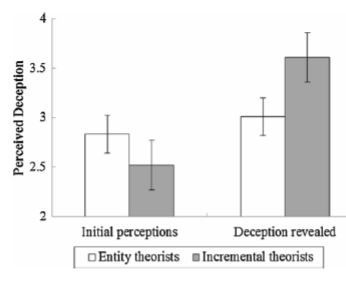By Jeff Soplop What Happened to the Political Price for Lying? (Part 2) Recently I wrote about the political price of lying and how there is a serious disconnect between voters (including republican voters) saying they want honesty in a politician and how they act. My initial conclusion was that many voters are lying to themselves and so, consequently, end up lying to pollsters. With this in mind, the next question is this: just how dishonest are voters about their priorities? Behavioral science may help fill in part of the picture. Some of the most salient behavioral research considers how we perceive honesty and integrity in others. In one notable study, researchers focused on how individual beliefs about the nature of intelligence altered these
Topics:
Dan Crawford considers the following as important: politics, US/Global Economics
This could be interesting, too:
Robert Skidelsky writes Lord Skidelsky to ask His Majesty’s Government what is their policy with regard to the Ukraine war following the new policy of the government of the United States of America.
Joel Eissenberg writes No Invading Allies Act
Ken Melvin writes A Developed Taste
Bill Haskell writes The North American Automobile Industry Waits for Trump and the Gov. to Act
by Jeff Soplop
What Happened to the Political Price for Lying? (Part 2)
Recently I wrote about the political price of lying and how there is a serious disconnect between voters (including republican voters) saying they want honesty in a politician and how they act. My initial conclusion was that many voters are lying to themselves and so, consequently, end up lying to pollsters.
With this in mind, the next question is this: just how dishonest are voters about their priorities? Behavioral science may help fill in part of the picture.
Some of the most salient behavioral research considers how we perceive honesty and integrity in others. In one notable study, researchers focused on how individual beliefs about the nature of intelligence altered these perceptions
The researchers divided study participants into two groups that are defined by their view of intelligence, entity theorists and incremental theorists. These definitions are supported by a broad base of research on human personality and intelligence, and were initially proposed by Carol Dweck of Stanford University.
Entity theorists tend to believe that intelligence is fixed and based on underlying traits, and so they often draw conclusions even from having only limited information about others. Incremental theorists, by contrast, view intelligence as malleable and able to be developed through hard work.
Once divided, study participants – in this case a group of MBA students – were randomly split into buyers and sellers and guided through a multi-stage exercise called the Bullard Houses negotiation case. The exercise involved negotiating over a fictional property sale and was structured such that buyers had an incentive to deceive the sellers but were not allowed to reveal their deception. Research assistants, who were blind to the hypotheses, coded the negotiations. In almost all cases (94%), buyers did in fact engage in a deception of the seller.
After the negotiations, sellers were asked to rate the extent that their buyers had misrepresented themselves both before and after the buyers’ true intentions were revealed. The results are shown below and broken out by entity theorists and incremental theorists.
As shown in the chart, entity theorists’ perceived deception changed much less after the deception was revealed than incremental theorists. In a follow-up experiment, this time conducted with Amazon’s Mechanical Turk service marketplace and a scenario about a used computer that was sold despite having a known issue, the results again showed that entity theorists’ perceptions changed little even after finding out they had been swindled.
Other research examined these traits from another angle, focusing instead on participants’ willingness to place blame on others. Despite different approaches and scenarios, entity theorists remained reluctant to place blame, even after someone consistently failed to show empathy to the suffering of others.
Does that mean most Trump voters are entity theorists and therefore unwilling to hold him to account for his nonstop onslaught of falsehoods? Possibly, although this research isn’t easily generalizable to such a large population. But it certainly offers useful insight into some of the ways our personalities and beliefs affect our abilities to spot deceit and place blame where it belongs.
It would be useful to compare these findings to economic analyses on how we value, or price, honesty in others. But here there seems to be gap in the literature. There are plenty of studies on the potential value (and costs) of acting honestly versus cheating. Economists have come up with a number of ways to test how and when people decide to be truthful using techniques ranging from dice games to envelopes of money left in public places. In general, results from this research show that while circumstances do matter, most people will choose to cheat at least some of the time.
The flip side of these findings—how much value we place on honesty and why—is noticeably missing from these economic investigations (or at least from what I was able to find). But from the behavioral research available, a part of the explanation for voters’ incongruity between how much they say they value honesty and how they act is that these voters are, in fact, lying, but mostly to themselves. Whether that disconnect changes over time, and Trump reaches a point where his accumulated duplicity finally dispirits his core supporters, remains to be seen. Given the astounding rate at which Trump utters falsehoods, we’re in the midst of an interesting natural experiment that isn’t likely to end anytime soon.

